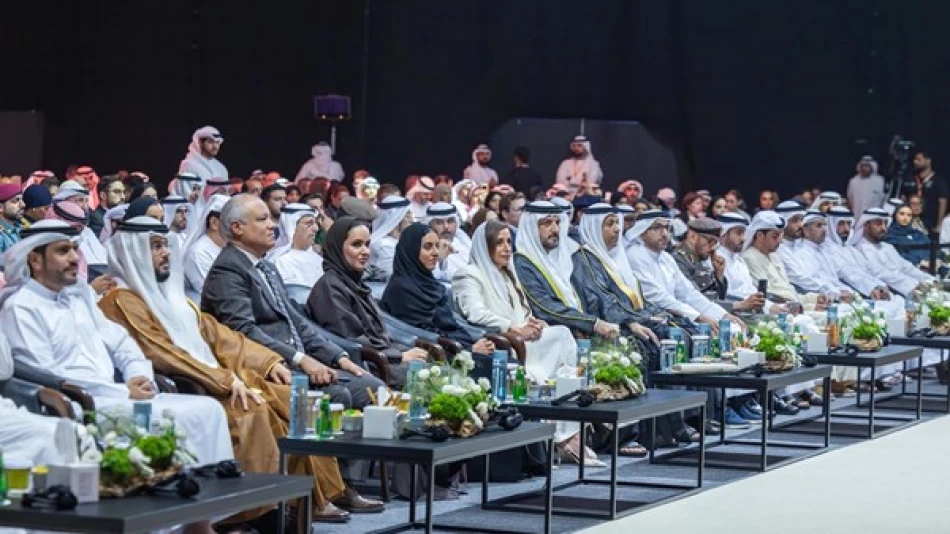
Sharjah Communication Award Winners Honored by Sultan bin Ahmed
Sharjah Government Communication Awards Spotlight Regional Leadership in Public Sector Innovation
The 12th edition of the Sharjah Government Communication Awards has concluded with recognition for 23 categories spanning government entities across the Gulf and beyond, signaling the emirate's growing influence as a hub for public sector communication excellence. The ceremony, held alongside the 14th International Government Communication Forum under the theme "Communication for Quality of Life," drew over 2,600 applications from across the region, highlighting the increasing sophistication of government outreach strategies in the Middle East.
Saudi Arabia Dominates Innovation Categories
Saudi Arabia emerged as the standout performer, securing multiple awards across key innovation and youth engagement categories. The Kingdom's Ministry of Information claimed the prize for Best Innovation in Government Communication, while the Ministry of Human Resources and Social Development won for campaigns targeting positive youth impact. The Ministry of Municipalities and Housing also took home the award for Best Crisis Communication Strategy.
This sweep reflects Saudi Arabia's broader Vision 2030 transformation agenda, which has prioritized modernizing government communication as part of its economic diversification efforts. The Kingdom's investment in digital-first communication strategies mirrors similar initiatives seen in the UAE and Singapore, where governments have recognized that effective public engagement is crucial for implementing large-scale reforms.
Regional Competition Intensifies
The awards ceremony revealed intensifying competition among Gulf states to establish themselves as leaders in government innovation. Dubai's General Directorate of Residency and Foreigners Affairs won the Best Integrated Communication System award, while Sharjah's Department of Agriculture and Livestock secured recognition for Outstanding Communication Impact on Quality of Life.
Private Sector Integration Gains Momentum
Notably, the awards included significant private sector participation, with companies like "Atanafas" Creative Production and Saudi Arabia's "Touch" company winning alongside government entities. This public-private collaboration trend reflects a broader regional shift toward leveraging commercial expertise to enhance government communication effectiveness.
The inclusion of artificial intelligence-focused categories, in partnership with MIT's Quarter Century Center for Prosperity and Entrepreneurship, signals recognition that emerging technologies will reshape how governments engage with citizens. The US-Africa Zindi platform's victory in the AI for Community Service category demonstrates the global nature of this technological transformation.
Cultural Soft Power Takes Center Stage
The ceremony's emphasis on cultural identity and Arabic language promotion reveals strategic thinking about soft power projection. King Salman Global Complex for Arabic Language's first-place finish in the Cultural Identity and Arabic Language Enhancement category aligns with broader regional efforts to position Arabic culture as a global asset rather than merely a local tradition.
Sheikha Bodour bint Sultan Al Qasimi's recognition as "Distinguished Personality in Government and Strategic Communication" exemplifies this approach. Her leadership in securing UNESCO World Heritage status for Sharjah's Al Faya site demonstrates how strategic communication can transform cultural preservation into international recognition and economic opportunity.
Implications for Government Communication Evolution
The 170 finalists from an initial pool of 2,600 applications suggest that government communication in the Middle East has moved beyond basic information dissemination toward sophisticated engagement strategies. The judging committee's noted difficulty in selecting winners due to quality convergence indicates rapid professional development across the region.
Youth Engagement Becomes Strategic Priority
The dedicated youth categories, won by entities from Bahrain to Nigeria's International Institute of Tropical Agriculture, reflect governments' recognition that engaging younger demographics requires specialized approaches. This focus anticipates demographic transitions across the Middle East, where youth populations will drive economic and social change over the coming decades.
The international participation from Kenya, Thailand, and Nigeria alongside traditional Gulf participants suggests the awards are positioning Sharjah as a global center for government communication excellence, potentially competing with established hubs like Singapore or London for influence in this space.
Looking Forward: Technology and Transparency
The awards' integration of sustainability partnerships with organizations like the UN Institute for Training and Research (UNITAR) and the African Alliance Partnership indicates that effective government communication is increasingly viewed as essential for addressing complex global challenges from food security to refugee management.
For government communication professionals and technology vendors, these awards signal growing Middle Eastern markets for sophisticated engagement platforms and strategies. The emphasis on crisis communication and AI integration suggests particular opportunities in these specialized areas as regional governments prepare for future challenges while maintaining public trust and engagement.
Most Viewed News

 Layla Al Mansoori
Layla Al Mansoori






